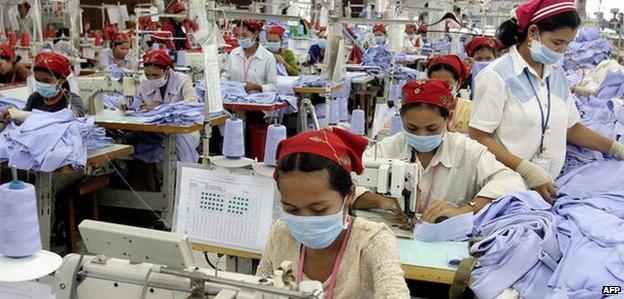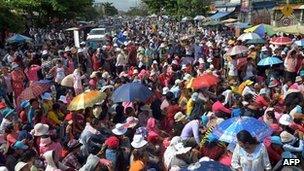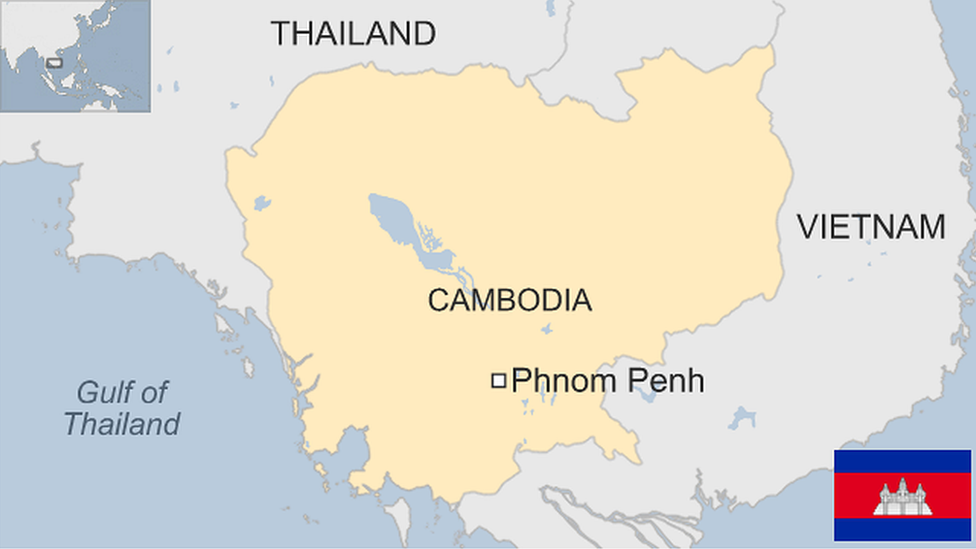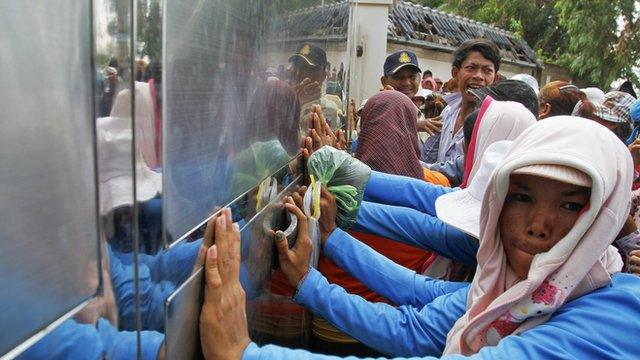Cambodia economy defies global trend but challenges remain
- Published

The manufacture and exports of garments has played a key role in Cambodia's growth in recent years
Some of the world's leading economies are seeing a slowdown in growth - dragging down the global economy with them.
But here in Asia, Cambodia - which goes to the polls on 28 July in a general election - is one country that has been defying the trend.
The South East Asian economy saw its growth pick up speed in 2012 and the Asian Development Bank (ADB) has forecast "further robust growth, with trajectory expected to steepen slightly in 2014".
According to the ADB, Cambodia's economy expanded at an annual rate of 7.2% in 2012, up from 7.1% in 2011 and 6% in 2010.
Cambodia, like many other countries in Asia, has for many years relied on its export sector to be a key driver of growth.
Low cost of labour has seen the country become a key manufacturer and exporter of garments and footwear to markets such as the US and European Union (EU).
Economic problems in those markets have dented consumer confidence, and in 2012 Cambodia saw the pace of growth of its exports decline - but , according to the ADB, domestic consumption jumped by 9.5% and is expected to rise further in the coming years. And as conditions in the US and EU improve, exports are likely to rebound.
"European demand for Cambodian garments and footwear is expected to maintain good growth, supported by duty-free access to the EU," the bank said in a report, external on the Cambodian economy published in April.
"Shipments to the US will likely be subdued this year but should pick up after that," it added.
'Destination of choice'
Another key driver of Cambodia's growth has been the surge in foreign direct investment in the country, which jumped by 75% last year to $1.5bn (£1bn).
Along with traditional sectors such as garment manufacturing, foreign money has also been used to help fund new industries such as auto-parts manufacturing and agricultural products processing.

Protesting Cambodian workers have been demanding higher wages
Low labour costs and Cambodia's proximity to key markets such as China and other emerging economies in South East Asia are attractive to foreign investors.
And with wages in countries such as Thailand and China on the rise, Cambodia is likely to become even more attractive.
"This trend is only going to get stronger with more companies looking to set up operations in Asia," says Rajiv Biswas, chief economist for Asia-Pacific at IHS Global Insight.
"Given its competitiveness and the current economic environment, Cambodia is going to increasingly become a destination of choice for foreign investors."
'Skill mismatch'
But there have been protests in recent months with workers demanding an increase in their wages.
And critics say for the country to take the next step in its growth cycle, it needs to diversify into high-end manufacturing on a bigger scale.
But Cambodia may find it tough to do so, not least because of the skill level of the majority of its labour force.
"A key restraint to growth is the skill mismatch, or the lack of adequately skilled labour in the high-end industries," says Srinivas Madhur, director of research at Cambodia Development Resource Institute.
"The enrolment rate in tertiary education is only 14%, which means the pool of skilled people is very small."
Mr Biswas says that the inability of Cambodia to move into advanced manufacturing is a "great vulnerability".
"What is crucial now, is that they need to develop their education sector and they need to build partnerships to bring more advanced education into the country, especially vocational training," he says.
Poverty concerns
Another key area of concern is that Cambodia remains one of the poorest countries in Asia.
Its per capita income in 2012 was $946, according to the World Bank, external. That compares with $5,474 in Thailand and $3,557 in Indonesia.
The ADB has quoted the World Health Organization as saying vitamin and mineral deficiencies alone cost Cambodia's economy $146m each year.
The bank says 55% of under-fives were anaemic in 2010.
And malnutrition and poor health stunt the growth of up to 40% of Cambodian children.
Economic growth has seen poverty levels come down - but critics say the country needs to do much more to ensure the benefits trickle down to the poor.
"Inclusive growth", they say, is a much better claim to fame than "robust growth".
- Published22 August 2023

- Published3 June 2013

- Published3 June 2013

- Published16 May 2013
